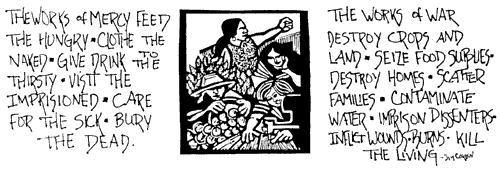The first bombs began falling on
Emotions were running high for local activists, my self included. I hastily joined an affinity group with a handful of other peace activists, and we began planning an action. I can remember feeling desperate to make some kind, any kind, of difference. The urgent need to stop the war pressed down on us, and we rushed our decision making process.
We decided to target the state legislature. We wanted them to issue a statement condemning the war, and to divest from the military industry (to effectively boycott Boeing, Microsoft, Caterpillar, etc.). We did not use the common channels. We didn’t contact our representatives, write a proposal, or try to find a legislator to introduce a bill. Instead, we sat down in front of the doors as the Senate was about to go into session, locked our necks together with bicycle “U” locks, and issued a terse, one page statement for the press.
There was a rally of about 80 to 100 activists there to support us. There were about a dozen journalists present, representing newsprint, radio stations, and television. There was a small army of State Patrol officers, who marched up in step with one another, forming a wall around us. The rally participants danced, played games, and taunted the police.
The atmosphere was dramatic, and we were certainly getting a lot of attention. At one point, a great big State Patrol officer (Sgt. Dahl, I believe), took a water bottle from one of my fellow affinity group members. She struggle with him for a moment over the bottle, before the top of the bottle popped off, spraying water all over. The press rushed in with their cameras, capturing this dramatic little moment for posterity. Immediately a cry went out among the crowd, and they began yelling and chanting slogans about “human rights”. Some of the other members of the affinity group chanted with them, and protested the officer’s actions. All for a water bottle.
In the end, the police cut our “U” locks and arrested us. I tried to shift the tone of the event a little by openly, loudly, and cheerfully thanking and praising the officer who arrested me.
I don’t regret participating in civil disobedience. But in hindsight, there is a lot that I would have done differently. We didn’t follow the standard nonviolent (read: mature) model for dialogue, negotiation, contemplation, self-criticism, and action. We rushed in prematurely. Even our choice to target the state government is pretty hard to justify. And, as the event unfolded, our lack of circumspection became evident through our behavior.
I see a lot of similar problems running through our local peace movement. There are a lot of unnecessary confrontations with the police. There is a lot of unnecessary attention seeking behavior. There is a lot of unnecessary and counterproductive defiance, agitation, and inappropriate behavior. And when the police react to this behavior, there is a lot of complaining.
The recent protest at the
Some of the behaviors at the Unity in the Community festival last Monday also offer a good example. The gathering, which took place in
The festival was a lot of fun. There were speakers from a variety of social justice organizations and faith communities, as well as belly dancers, bands, and poets. Booths were set up around the edge of the park addressing issues that ranged from immigrants’ rights to workers’ rights and women’s rights to choose. Children played games through the facilitation of the YMCA. There were youth, couples, children, elderly people, activists, imams, food vendors, rabbis and priests.
In the midst of the festivities, at around
I was shocked and embarrassed to hear, as I walked down the street to the park, amplified obscenities echoing off the walls of downtown
Just as I entered the park a State Patrol officer cut the power to the band. Several of the parents there looked relieved. But a small contingent of angry festival participants descended on the officer, badgering him about their “first amendment rights”. I even overheard one person say, “You mean you’re going to let the Nazi’s speak tomorrow, but you won’t let us play this music?!”
When the Olympian printed an article on our festival a couple days ago, someone wrote on the comments page: “We note that in all the times the Nazis have demonstrated locally they have been peaceful and complied with the law. Protestors at the
Our own misbehavior undermines our work as activists. It misdirects our energy into unproductive conflicts, fuels the complaints of our ideological opponents, alienates people who agree with us, and even occasionally gets someone hurt.
If we are to be effective, if we are to earn the respect of the people whose minds we would change, we must expand our capacity for circumspection and self-criticism.
To misbehave at a rally, and then to complain about “double standards”, begs the question of who is setting the standards. It certainly isn’t us.


